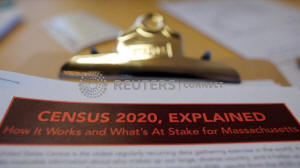|
Supreme Court to issue major census,
electoral map decisions
 Send a link to a friend
Send a link to a friend
 [June 27, 2019]
By Lawrence Hurley [June 27, 2019]
By Lawrence Hurley
WASHINGTON (Reuters) - The U.S. Supreme
Court is due to issue eagerly awaited decisions on Thursday in cases on
the Trump administration's attempt to add a contentious citizenship
question to the 2020 census and bids by voters to stem the partisan
manipulation of electoral district boundaries, a practice called
gerrymandering.
The court, which has a 5-4 conservative majority, has five cases
remaining to decide during its current term, which began in October and
ends on Thursday, with the rulings set for 10 a.m. (1400 GMT).
The political consequences arising from the rulings in legal challenges
to the census question and partisan gerrymandering could be significant,
leaving lasting effects on elections for seats in the U.S. House of
Representatives and state legislatures at a time of political
polarization in America.

Opponents have called the move by President Donald Trump's Commerce
Department to add a citizenship question to the census a Republican
maneuver to deter immigrants from taking part in the decennial
population count out of fear of deportation. The intent, these critics
have said, is to manufacture a deliberate undercount of areas with high
immigrant and Latino populations, costing Democratic-leaning regions
seats in the House, benefiting Republicans and non-Hispanic whites.
In April's argument in the case, the court's conservative justices
appeared to be inclined to rule in Trump's favor.
A group of states including New York and immigrant rights organizations
challenged the legality of the citizenship question. Evidence that
surfaced in May bolstered their claim that the citizenship question was
aimed at furthering Republican Party political goals.
Documents created by Republican strategist Thomas Hofeller, who died
last year, showed that he was instrumental behind the scenes in
instigating the addition of the citizenship question. He was an expert
in drawing electoral district boundaries that maximize Republican
chances of winning congressional elections.
Hofeller concluded in a 2015 study that asking census respondents
whether they are American citizens "would clearly be a disadvantage to
the Democrats" and "advantageous to Republicans and Non-Hispanic Whites"
in redrawing electoral districts based on census data.
[to top of second column]
|

An informational pamphlet is displayed at an event for community
activists and local government leaders to mark the one-year-out
launch of the 2020 Census efforts in Boston, Massachusetts, U.S.,
April 1, 2019. REUTERS/Brian Snyder/File Photo

The Trump administration has said it planned to add the question to
gather better data to enforce the Voting Rights Act, which protects
eligible voters from discrimination. Hofeller suggested that
rationale in the newly disclosed documents. The challengers have
said that rationale is a merely pretext to hide a political motive.
GERRYMANDERING IN SPOTLIGHT
Separate cases from North Carolina and Maryland focus on whether the
justices will empower courts to impose restrictions on partisan
gerrymandering, the practice in which electoral districts are
devised to magnify the political power of the party already in
control of a state's legislature.
The geographical boundaries of House districts and those in state
legislatures are reconfigured every decade to reflect population
changes determined by the census. During arguments in March,
conservative justices indicated skepticism toward permitting
judicial intervention to curb gerrymandering.
In two other cases, the court is due to rule on Thursday on whether
police need a court-issued warrant to draw an unconscious suspect's
blood and on whether to greatly expand the area considered as part
of a Native American reservation in Oklahoma.

The court on Friday could announce whether it will take up various
pending appeals including the Trump administration's bid to salvage
the Republican president's attempt to end a program that protects
from deportation hundreds of thousands of immigrants dubbed
"Dreamers" who were brought illegally into the United States as
children. The program, called Deferred Action for Childhood Arrivals
(DACA), was launched in 2012 by his Democratic predecessor Barack
Obama.
(Reporting by Lawrence Hurley; Editing by Will Dunham)
[© 2019 Thomson Reuters. All rights
reserved.]
Copyright 2019 Reuters. All rights reserved. This material may not be published,
broadcast, rewritten or redistributed.
Thompson Reuters is solely responsible for this content. |